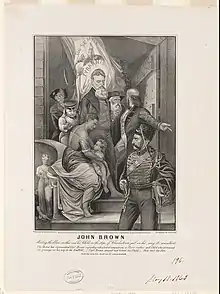Children of the plantation
"Children of the plantation" was a euphemism used during the time of slavery in the United States, to identify the offspring of slave Black women with White men, usually the owner or one of his sons or the plantation overseer.

This process was so immense and commonplace, that nearly 20% of the US Black (making them a mixed Afro-European group versus purely African) ethnic group's genetic contribution originates from Europe (much lower for non-US slave import origin such as Jamaican/Haitian).[1]
Such children were born into slavery, through an American legal doctrine known as partus sequitur ventrem. They were classified as mulattoes, a historic term for a multiracial person. The one drop rule meant that they could never be part of white society.
A minority of fathers treated these children well, sometimes providing educational or career opportunities, or manumitting them. Examples are Archibald and Francis Grimké, and Jefferson's children by Sally Hemings.
Alex Haley's Queen: The Story of an American Family (1993) is a historical novel, later a movie, that brought knowledge of the "children of the plantation" to public attention.
Edward Ball's Slaves in the Family (1998), written by a White descendant of slave owners, describes this complex legacy.
Toni Morrison wrote that this sexual usage of slaves was known as droit du seigneur,[2] the "right of the lord".
See also
- Slave breeding in the United States
- Plaçage, interracial common law marriages in French and Spanish America, including New Orleans
- Sexual slavery
- Treatment of slaves in the United States
- House negro and field slaves in the United States, distinctions within the plantation system
- Discrimination based on skin color or "colorism"
- Essie Mae Washington-Williams, the mixed-race daughter of segregationist politician Strom Thurmond
- Jefferson–Hemings controversy regarding the sexual relationship between Thomas Jefferson and his slave, Sally Hemings, resulting in six children
- Colonial American bastardy laws
- Issue (genealogy)
- Legitimacy (family law)
- Non-paternity event
- Atlantic Creole
- African American genealogy
- Female slavery in the United States
- Slavery in the colonial history of the United States
- History of sexual slavery in the United States
- Enslaved women's resistance in the United States and Caribbean
References
- Parra, Esteban J.; Marcini, Amy; Akey, Joshua; Martinson, Jeremy; Batzer, Mark A.; Cooper, Richard; Forrester, Terrence; Allison, David B.; Deka, Ranjan; Ferrell, Robert E.; Shriver, Mark D. (December 1998). "Estimating African American Admixture Proportions by Use of Population-Specific Alleles". The American Journal of Human Genetics. 63 (6): 1839–1851. doi:10.1086/302148. PMC 1377655. PMID 9837836.
- Morrison, Toni (2017). The Origin of Others. Harvard University Press. p. 9. ISBN 978-0-674-97645-0.